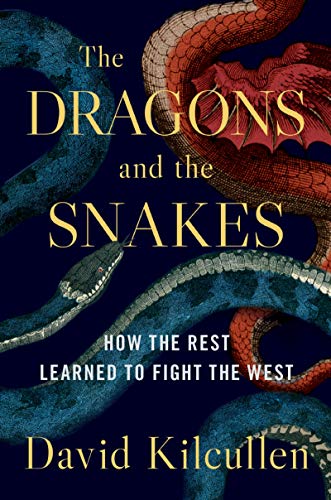Who will win vs the West? The snakes (non-state actors)? Or the dragons (Russia, China)? Or have the snakes & dragons remarkably converged in their methods (1)? There is no real happy ending for the West in this choose your own adventure approach to future warfare 1/
Kilcullen's work is pretty similar to Sean McFate's New Rules of War, which came out last year. You can see my review of it and a related book on future warfare here: https://fieldgradeleader.themilitaryleader.com/future/ Of the two, I think Kilcullen gets the edge because he offers more nuance 2/
McFate tends to be too dismissive of conventional capabilities (from the F-35 to cyber), whereas Kilcullen says the US, and the West more broadly, need to balance the two, making carefully choices in what tech it needs to pursue. 3/
One could argue the US currently veers widely from year to year in what tech it chooses to pursue. AI! No. semiconductors! No, hypersonics! Kilcullen says, sorry you can't have it all. 4/
More broadly, he takes the US to task for its way of battle. As such, the US too narrowly conceives what war is. Also, it will continue to lose if it keeps pursuing a “high-tech, high-precision, high-cost suite of networked systems” (6). 5/
These limitations are epitomized by the failure at Dora Farms in 2003 to hit Hussein, which only highlights problems like "vulnerability of precision systems to inaccurate intelligence, their dependence on data and connectivity" 6/
Opponents increasingly can be understood as "amorphous, cell-based enem[ies] who blended into the physical and human terrain of a society and culture we barely understood"--again, his point is that this is increasingly true of the snakes AND the dragons (i.e. Russia & China) 7/
And these opponents got a lot smarter since Desert Storm. Drone strikes, for ex, could never overwhelm an org. Instead, they just pruned them and destroyed the weak. And, in these losses, the snakes learned how to adapt & benefited from the "democratization of lethality" 66 8/
The first half of the book focuses on the snakes. The second turns to the dragons. Kilcullen uses different words like liminal to describe the kind of gray zone or whatever word you prefer to describe how dragons seek to avoid provoking direct US mil response 9/
Russia stresses more the aspect of time, seeking to benefit from the slower response of Western nations to actions because they generally seek consensus. Thus, rather than the OODA loop, Kilcullen stresses “detect-attribute, decide, mount, and launch” (158). 10/
And decide tends to be the longest phase, for reasons already mentioned, which is problematic. Also, attribution is more challenging than ever, in part because of the way people are being camouflaged more creatively than the proverbial little green men 11/
China is different. Kilcullen uses another fancy term "conceptual envelopment" to describe the risky situation he sees unfolding: if China has a broader def of war, West may be oblivious to what is war unfolding right beneath its nose. By the time "real" war.... 12/
breaks out (by the West's narrow def) it is too late. On the other hand, the West might engage in what it sees as technically "peaceful" activities that China might view as acts of war because it has such a broader view. 13/
In this light, it is difficult to know right balance. For ex, some Russian officers espouse a "roughly 4:1 ration of nonmilitary and military measures" (162). Is that the right answer? Kilcullen might as well be an annoying staff college instructor (ask me how I know ) 14/
) 14/
 ) 14/
) 14/
because he doesn't weigh in on that precisely. What he does offer as a strategy is something Byzantine, although he still worries it might be too late. The goal he seeks is “long-duration sustainability” by buying time. There's no bold strategy 15/
Rather, the West should selectively pursue certain technologies, set adversaries at odds with each other, and embracing hybrid operations (i.e. learn from dragons). I warned you there was no happy ending...16/
The West must set aside its problematic goal of battlefield dominance to a more defensive one of preventing the dragons from “dominating us” (255). 17/
And, in light of an “operating environment” that has “become dramatically more crowed, cluttered, urbanized, coastal, and connected,” it must think carefully about what to buy, balancing conventional & more unconventional. 18/
Re Kilcullen's framework, now read something like this to think about how well West is preparing for future warfare https://breakingdefense.com/2020/02/gen-hyten-on-the-new-american-way-of-war-all-domain-operations/ It's a debate well worth having; as always, it comes down to tough choices. And, in light of COVID, those choices are even harder 19/&end

 Read on Twitter
Read on Twitter



